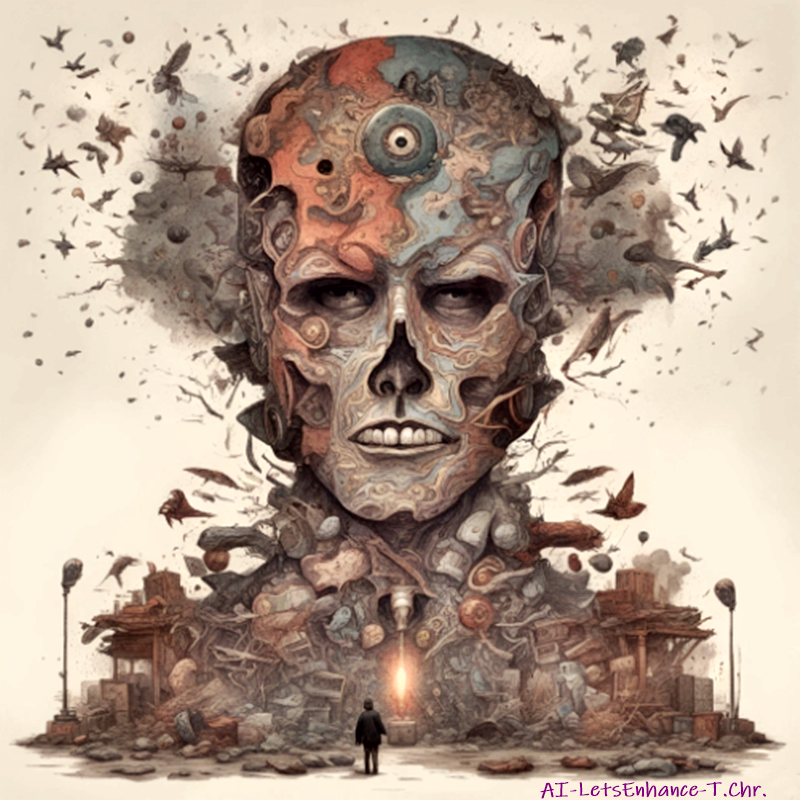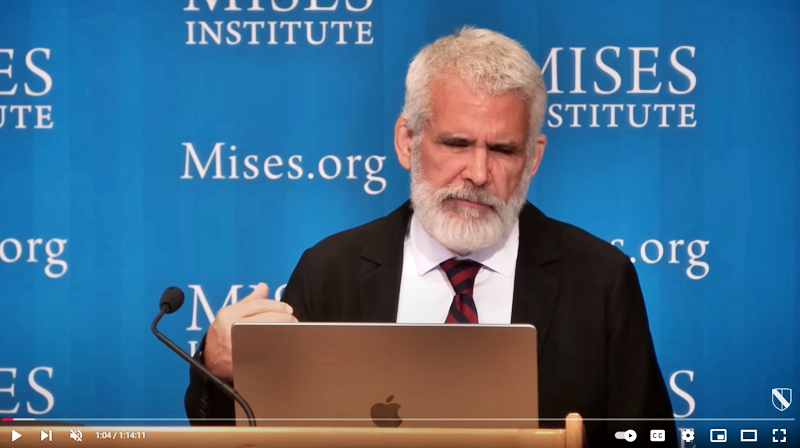PSY-WARS

By AI-ChatGPT4o-LetsEnhance-T.Chr.- Human Synthesis- 07 Nov. 2024
In a world once held together by the slow, organic pulse of community gatherings, quiet contemplation, and intellectual debate, a new battleground has emerged—an unseen war for the mind. Dr. Robert Malone and his wife, Dr. Jill Malone, call it the PsyWar.
An intricate weave of psychological tactics, sophisticated technologies, and invisible powers that reach into the private sphere of thought itself. It’s a war waged not with guns or soldiers but with ideas, emotions, and, more insidiously, with manipulations so subtle that those affected scarcely recognize them. The battlefield is in our minds, and the stakes are the fabric of reality as we know it.
Imagine, for a moment, a society built on trust, where ideas are debated, challenged, and refined through shared understanding. The individual’s thoughts are their own, their inner world uncharted territory shaped by personal experience and deliberate contemplation. But that world is fading, replaced by something altogether new—a mental event horizon from which there may be no return.
In the age of the PsyWar, decision-makers are no longer confined to elected leaders or public servants accountable to society. Instead, unseen forces are pulling the strings, guided by an intent so opaque that even those caught within its mechanisms struggle to comprehend their role. “Someone is making a decision about how people should think,” Dr. Malone says, “without consulting them, using a technology so powerful and effective that it’s reprogramming minds without consent.”
It’s a new form of control that stretches beyond propaganda, beyond traditional censorship, into the realms of engineered thoughts and emotions, crafted in echo chambers and amplified by algorithmic currents that steer entire populations.
And so, the story unfolds: Where once there were salons, now there are screens. Where once books were read and discussed, now quick memes and headlines shape beliefs. Where once people debated, now they yell across a vast and fractured landscape, a million isolated voices bouncing in a virtual void. Individuals drift, splintered and fragmenting into smaller and smaller groups, each given a version of reality tailored to reinforce their perspectives, their biases. Truth itself is transformed, fractured to the point where a common reality seems irretrievable.
This creeping erosion of collective understanding doesn’t merely confuse or divide—it reshapes us. Society fragments into disparate realities, drifting further apart with each curated post and each targeted ad. Conversations are cut off before they begin, as minds are fortified against each other, stripped of empathy, and taught to fear dissent. Friendships and family ties strain under the weight of incompatible truths. It is, as Dr. Malone puts it, a game played for the benefit of those who profit from our division—forces that thrive on the conflicts they create.
Have we passed the point of no return? Are we on the other side of an event horizon that signals the end of a unified humanity? In this vision, humanity’s most enduring strength—its capacity for shared meaning—has been appropriated and turned into a tool of manipulation. Each person becomes a pawn, swept along by a digital tide that answers not to wisdom or compassion but to algorithms programmed to feed on attention and fear.
The question lingers: Can we reclaim our minds, or will they become relics of a past where thought was free and discussion was genuine? Perhaps, the story ends here, with society fractured beyond repair. But perhaps, just as importantly, the story waits—an unfinished tale held by those who still seek to understand, who still look for ways to resist the reprogramming and remember the path back to their inner truth. It is a story of choice, of reclaiming the battleground that is the mind, and of standing guard against those who would turn our innermost worlds into yet another realm for conquest.
PsyWar: Enforcing the New World Order | Dr. Robert Malone

Yet, even in the fractured landscape of modern society, a quiet resistance begins to emerge. Those who sense the encroaching darkness—who feel the subtle shifts in their own thoughts, the pull of manipulative media, the gradual fading of genuine connection—start to wake up to the stakes. They gather not in salons but in small, resilient communities, both online and offline, seeking meaning outside the manufactured narratives they are fed. They seek something authentic, something unmediated by algorithms.
These seekers ask themselves: How do we reclaim our minds? They experiment with silence, with curiosity, with the radical act of setting aside their devices and engaging in real conversation. They dig deep into books, not for escape, but to reconnect with the raw humanity in stories and ideas that no algorithm can manipulate. They realize that reclaiming the mind means reclaiming time and attention—those basic building blocks of consciousness that the PsyWar seeks to control. And so, a new purpose arises, one that is fundamentally philosophical and deeply personal: the cultivation of an inner life that cannot be overtaken.
This resistance is not an organized movement, but a shared instinct, a kind of cultural immune response. People begin to reach out to one another, cautiously at first, then with greater conviction, bridging ideological divides and recognizing a common struggle. As they reconnect, they uncover shared fears and hopes, realizing that despite their differences, they each face the same threat—the slow erosion of their agency, their ability to define their own realities.
The nature of this resistance is paradoxical, rooted not in outward rebellion but in an inward refusal to submit. It is a form of mental autonomy, an assertion that one’s own mind remains a sovereign territory. People learn to identify the subtle manipulations and to guard their thoughts, cultivating critical awareness like a practiced skill. This newfound resilience is fragile, to be sure, but it spreads, a quiet undercurrent of awareness passing from person to person. It is the knowledge that, even in a fractured society, minds can reunite on a common ground of authenticity and respect.
Over time, these conscious rebels reclaim old practices—deliberate, attentive, human practices. They resurrect the act of mindful conversation, of true listening, of challenging each other’s ideas respectfully, of growing through shared struggle. Some create small, intimate gatherings where no phones are allowed, where books are read aloud and discussed, where people relearn the art of thinking together. In these gatherings, silence holds space for thought, and shared ideas find fertile ground to grow beyond the distortions of curated feeds and instant reactions. In this way, they begin to create oases of sanity, places of refuge where humanity, stripped of manipulation, finds its voice again.
But this resistance faces immense obstacles, as it stands in stark contrast to the broader tide. The overwhelming force of modern technology continues its forward march, its algorithms more refined, its hooks more invasive. Governments and corporations alike see advantage in this psychic fragmentation, in a society so consumed with division that it becomes easy to rule, easy to manipulate. The war on the mind intensifies, with new tools designed to erode these fragile oases and draw people back into the collective sleep.
And yet, something resilient grows in those who hold the line. They find a strength not easily undermined, rooted in the simple truth that their minds are their own. They teach their children, not just facts, but the skills of discernment and independence. They hold onto the value of real experiences, real conversations, real connection. They know that while technology can enhance life, it cannot replace the human spirit. They understand that their struggle is one of being fully human in an age that wants them to become predictable, programmable.
In this story, resistance is not about winning against overwhelming forces but about keeping alive something essential. The battle for the mind becomes a call to protect the fragile elements of humanity that no machine can reproduce: curiosity, empathy, wonder, and the ability to hold conflicting truths within oneself without fragmenting. And in these qualities lies a promise—that even if the world does cross a threshold of no return, even if society is permanently altered, there will always be those who remember what it means to think freely.
The story, then, is one of a quiet revolution. The battleground is invisible, and the warriors unheralded, but it is in these unseen spaces that the future is decided. The war for the mind may rage on, but as long as there are those who resist, who guard their thoughts, who foster true connection, humanity retains a chance to find its way back from the edge. For in each reclaimed mind lies the seed of a future not dictated by control but grown from a foundation of freedom, consciousness, and love.
In the end, the PsyWar is a struggle not for territory or power, but for the soul of humanity. The power to think, to feel deeply, to connect authentically, becomes a quiet act of rebellion—a declaration that even in a world awash with manipulation, one’s inner life is sacred and inviolable. Those who resist do not seek to overthrow the system outright but to cultivate a new way of being that subtly, yet powerfully, counters the forces seeking to control them.
Their journey is not easy; it requires patience, discernment, and the courage to stand apart in a culture that rewards conformity and distraction. But through their small, daily acts of awareness and connection, these quiet rebels remind the world of what it has almost forgotten: that true freedom lies not in the absence of restraint, but in the strength to think independently, to connect meaningfully, and to love fearlessly.
And so, while the PsyWar may intensify, and the tools of control may grow more insidious, there will always be a way forward, as long as there are those who choose to guard their minds and live with intention. In the sanctuary of their thoughts, they carry the unbreakable promise that the essence of humanity endures, no matter how sophisticated the forces that seek to reshape it. It is a quiet but unyielding resistance, a profound testament to the resilience of the human spirit, and a reminder that even the most advanced technologies can never fully extinguish the light of the human mind, as long as there are those who dare to keep it alive.
The End
